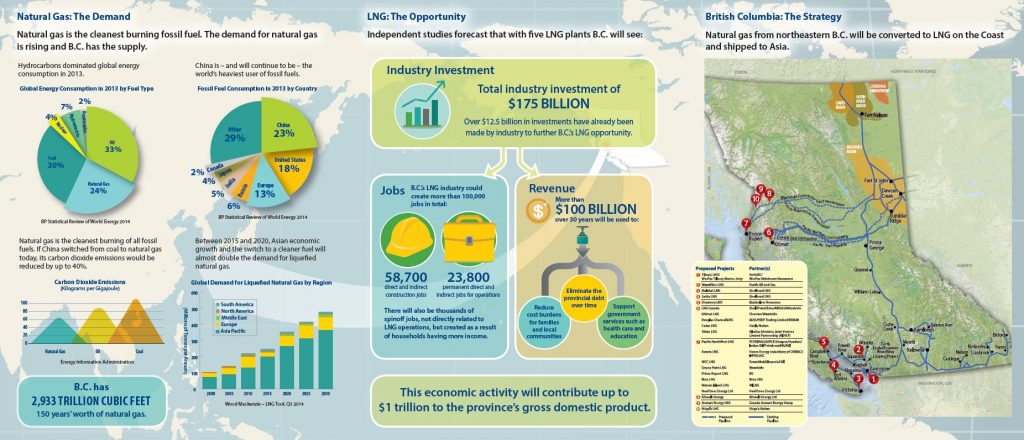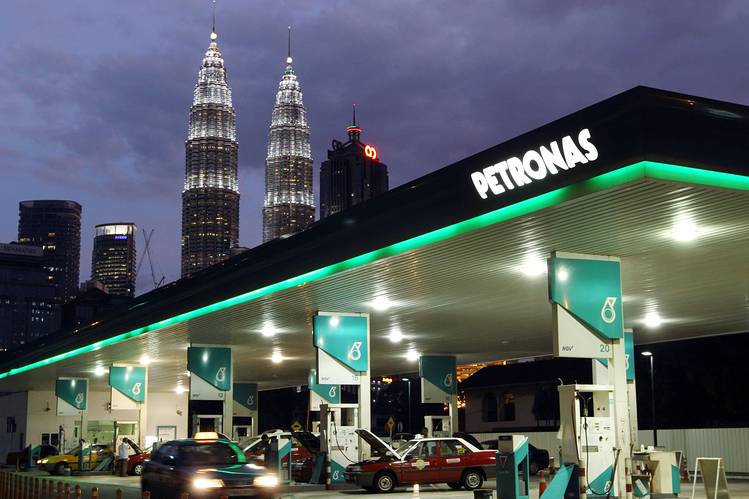Memo #340
By Kai Ostwald – kai.ostwald [at] ubc.ca
 Liquefied Natural Gas (LNG) production is an important potential source of revenue and new jobs for British Columbia. The consortium tasked with developing the industry is led by Petronas, the Malaysian state-owned national oil firm. Given the size of investments (an initial $12 billion) and the environmental risks the project entails, the policy decision would be contentious even under ordinary circumstances.
Liquefied Natural Gas (LNG) production is an important potential source of revenue and new jobs for British Columbia. The consortium tasked with developing the industry is led by Petronas, the Malaysian state-owned national oil firm. Given the size of investments (an initial $12 billion) and the environmental risks the project entails, the policy decision would be contentious even under ordinary circumstances.
Circumstances are extraordinary, however, as Malaysia is contending with several high profile scandals, including claims that $700 million from the debt-ridden state-owned investment company 1MDB landed in Prime Minister Najib’s personal bank accounts. Critics of the LNG project have pounced on the crisis, noting that like 1MDB, Petronas is wholly owned by the Malaysian government, lacks transparency in its operations, and reports directly to the embattled Najib.
B.C’s LNG project actually involve three distinct dimensions. But, these have frequently been conflated in the contentious debates about the project.
First, are the benefits of the project under the currently negotiated terms sufficiently large to outweigh the inevitable environmental and social costs? This is ultimately a question on the relative value of growth vs. conservation, though the project’s many unknowns make projections difficult.
Second, does Petronas have the technical and financial capacity to successfully complete the project? While concerns have been raised about its safety standards, social sensitivities, and financial stability, Petronas is a Fortune 500 company whose long-term survival depends on international projects like this one. It seems realistic to expect Petronas to uphold high standards in Canada, though with few previous projects in industrialized countries, there is little precedent to lend confidence.
Third, is it unethical to work with Petronas given Malaysia’s scandals? From a comparative perspective, Malaysia’s development has been exceptional over the past half century, raising the ethical and governance standards to which the country should be held far beyond what it is currently demonstrating. Yet if the bar for B.C.’s ethical test is sufficiently high for Petronas to fail, other important international partners would likely also fall short.
The consequences of this decision will profoundly affect British Columbians for decades to come. Given these stakes, it is important that the policy decisions be made with clear consideration of all three distinct dimensions.
About the Author:
Kai Ostwald is an assistant professor in the Institute of Asian Research and the Department of Political Science, as well as the Director of the Centre for Southeast Asia Research, at the University of British Columbia in Vancouver.

Infographic: Economic activity produced from Liquefied Natural Gas (LNG) production is expected to contribute $1 trillion to British Columbia’s GDP (Credit: Government of British Columbia).

Petronas is a Malaysian oil and gas company. This gas station sits in front of Kuala Lumpur’s iconic Petronas Twin Towers (Credit: Bloomberg).
Links
- Tunku Abdul Aziz, “Malaysia Incorporated: Ethics on Trial,” Australian Journal of Public Administration, 58, no. 4 (1999): 19-25.
- Government of British Columbia, Liquid Natural Gas Information Zone.
- Yoolim Lee and Elffie Chew, “The Scandal that Ate Malaysia,” Bloomberg Markets.
- Peter O’Neil and Gordon Hoekstra, “Petronas: Powerful, Enigmatic, World Player,” The Vancouver Sun, September 11, 2015.
- “Petronas: The Model of a Modern National Oil Company,” Petroleum Economist (October 2013).
- Ambiga Sreenevasan, “Malaysia’s Many Scandals,” The New York Times, August 20, 2015.
Related Memos:
See our other memos on Malaysia.